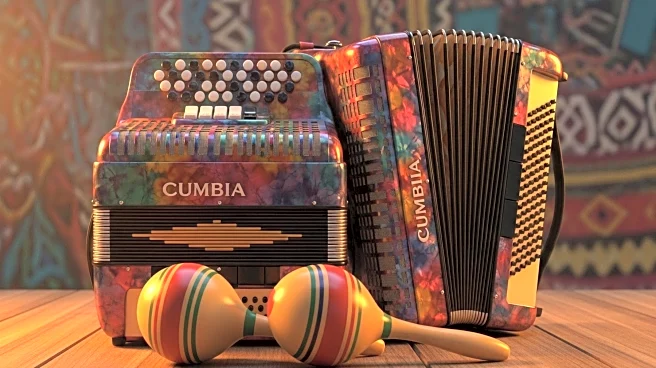What's Happening?
NPR has launched a visual series titled 'Cumbia Across Latin America,' which delves into the cultural significance and evolution of cumbia music. This genre, which originated on the Colombian coast during colonial times, has become a symbol of Latin American identity. The series, created by photographers and storytellers Karla Gachet and Ivan Kashinsky, takes viewers on a journey through six countries: Colombia, Mexico, Ecuador, Peru, Argentina, and the United States. Supported by the National Geographic Explorer Program, the series documents the people, places, and cultures that have kept cumbia alive. It features bilingual Picture Shows and a curated playlist, highlighting cumbia's journey from a working-class soundtrack to a globally recognized genre.
Why It's Important?
Cumbia's widespread influence underscores the power of music as a cultural connector and a reflection of societal changes. By tracing cumbia's journey, the series highlights the genre's role in shaping Latin American identity and its ability to transcend borders. This exploration is significant for understanding the cultural dynamics within the Americas and the impact of migration on music. The series not only celebrates cumbia's rich history but also emphasizes the ongoing cultural exchange between Latin America and the United States, showcasing how music can bridge diverse communities and foster a shared cultural heritage.
What's Next?
The series is expected to spark further interest in cumbia and its cultural roots, potentially leading to increased recognition and appreciation of Latin American music in the United States. As the series reaches a broader audience, it may inspire new collaborations and creative projects that continue to explore and celebrate the genre's diverse influences. Additionally, the series could encourage discussions on cultural preservation and the role of music in maintaining cultural identity amidst globalization.
Beyond the Headlines
The exploration of cumbia in this series also touches on broader themes of cultural resilience and adaptation. As cumbia has evolved, it has absorbed local styles and reinvented itself, reflecting the dynamic nature of cultural identity. This adaptability highlights the importance of cultural exchange and the ways in which music can serve as a vehicle for storytelling and historical preservation. The series may also prompt reflections on the ethical considerations of cultural appropriation and the responsibilities of artists and audiences in honoring the origins of the music they enjoy.












